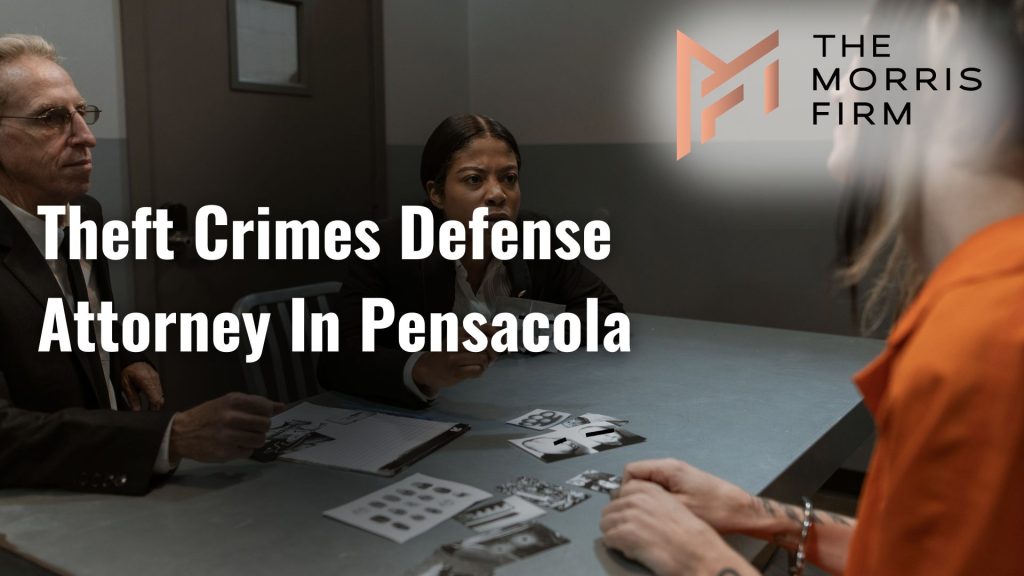
Are You Facing Theft Charges? Contact The Morris Firm
According to Florida Statute § 812.014, theft occurs when a person knowingly obtains or uses another’s property for their own advantage or to deny the owner access to their belongings. The penalty for theft varies, depending on the value of the stolen item and if any injuries or fatalities resulted. If you’re facing charges of a theft crime in Pensacola, contact the Pensacola criminal defense lawyers from The Morris Firm for legal representation.
Theft comes with serious consequences in Florida. Even if you get convicted of something minor, such as shoplifting, you still have to give your fingerprints, which could end up in a database that shows up in background checks. You don’t want to risk your reputation, job, and family. When you hire us, we’ll fight the charges against you to get them reduced or dropped and secure your freedom.
Call (850) 503-2626 to speak with an experienced Pensacola theft crimes attorney about your case and find out how we can help.
Theft Crimes Defined
As stated in Florida Statute § 812.014, above, a person is guilty of committing an act of theft if they attempt to or willingly take someone else’s property and intend to:
- Use the property for personal use or the use of a person who doesn’t have legal ownership.
- Keep the victim from exercising their right to the stolen property.
We have experience defending our clients against numerous types of theft crime charges, such as:
- Fraud
- Forgery
- Larceny
- Conversion
- Misappropriation
- Theft
False Accusations Common
False theft accusations can happen for many reasons. If you’re facing theft charges, but you didn’t knowingly or intentionally commit the crime, you should hire a Pensacola theft crimes attorney immediately. We can address the situation promptly and attempt to convince the prosecution to drop the case.
Under certain circumstances, shoplifting could be a type of theft crime you commit mistakenly. Maybe you tried on an accessory and accidentally walked out of the store without paying for it. Other forms of theft occur because the offender has a psychological problem and doesn’t understand what they’re doing.
Either way, you must seek legal representation immediately. We will speak to law enforcement and the state attorney before things progress any further. We’ll use the evidence we find that proves you weren’t aware of the crime and shouldn’t get brought up on charges.
Common Theft Crime in Florida: Shoplifting
Shoplifting accounts for more petit theft offenses than any other crime in Florida. Depending on the item stolen, the charge could be a misdemeanor petit theft or felony grand theft.
Some people are genuinely unaware that they committed theft, but accusations can happen swiftly and lead to a wrongful conviction.
First-time offenders might be eligible for a diversion program. If it’s available, the state will drop the charges as long as you comply with specific conditions, such as attending counseling. As long as you comply for the designated period, the case will get expunged, and the charge won’t end up on your criminal record.
The penalty for shoplifting (retail theft) depends on the value of the stolen item:
- Value under $100: second-degree petit theft with a sentence of 60 days in jail and a $500 fine
- Value over $750: first-degree petit theft with a sentence of up to twelve months in jail and a $1,000 fine
If you already have two prior convictions for theft, you could face a felony petit theft charge. In this situation, the value of the item you stole won’t matter. You could face a third-degree felony charge, and the follow penalties:
- Five-year jail sentence
- $5,000 fine
Theft Crime Penalties in Florida
Florida laws separate theft crimes into two categories: petit or grand. The value of the item stolen typically determines the severity of the crime and under which category it falls.
Petit Theft
Second-degree petit theft: Also called petty theft, this is the lowest offense and includes stolen property less than $100. The penalty includes:
- Maximum of 60 days in jail
- Up to a $500 fine
First-degree petit theft: This includes stolen property between $100 and $300. The penalty includes:
- Maximum of one year in jail
- Up to a $1,000 fine
Grand Theft
Third-degree grand theft: This includes property valued between $750 and $20,000, or property valued between $100 and $750 that was stolen from inside or near someone’s home. Examples of third-degree grand theft include firearms, stop signs, cars, and wills. The penalty includes:
- Maximum of five years in prison
- Up to a $5,000 fine
Second-degree grand theft: This involves stolen property with a value between $20,000 and $100,000, emergency equipment over $300 in value, and cargo with a value under $50,000. The penalty includes:
- Maximum of 15 years in prison
- Up to a $10,000 fine
First-degree grand theft: This is the most serious grand theft offense. It includes stolen items valued higher than $100,000, using a car that leads to over $1,000 in property and real estate damage, and cargo above a $50,000 value. The penalty includes:
- Maximum of 30 years in prison
- Up to a $10,000 fine
Misappropriation
You probably heard the term embezzlement before, but most people don’t know what misappropriation is. Misappropriation is embezzling money only and not other assets or property.
For a misappropriation conviction, the prosecutor must prove that the defendant:
- Had permission to possess and control the funds of another person, entity, or organization;
- Knowingly misappropriated the money or did something that led to a misappropriation of funds; and
- Utilized the funds for their personal reasons, such as transferring it to a different bank account.
The penalty for a misappropriation conviction depends on the amount of money stolen.
Third-degree felony: Misappropriation of funds less than $20,000. The penalty includes:
- Maximum of five years in jail
- Up to a $5,000 fine
Second-degree felony: Misappropriation of funds between $20,000 and $100,000. The penalty includes:
- Maximum of fifteen years in prison
- Up to a $10,000 fine
First-degree felony: Misappropriation of funds over $100,000. The penalty includes:
- Maximum of thirty years in prison
- Up to a $10,000 fine
Fraud
Fraud is the act of falsifying information, falsely representing a matter of fact, or distorting the truth. The following five elements of fraud must exist to prove someone is guilty of fraud:
- The defendant knew their statement wasn’t true;
- They made a false statement of material fact;
- The act led to another person’s harm;
- The victim had confidence in the statement made by the defendant; and
- The defendant intended to deceive the victim.
There are different types of fraud charges, and each comes with its own set of penalties.
- Bank fraud: Fraudulently securing a loan or obtaining funds from a bank that you’re not allowed access to. The penalty could include up to 30 years in prison and up to $1,000,000 in fines depending on the amount of money.
- Wire fraud: Using wire communication or a telephone to obtain money or property under false representation or promises. The penalty could range from 25 years in prison to life in prison.
- Mail fraud: When a person uses UPS, FedEx, or USPS to commit a fraudulent act. The penalty includes up to twenty years in prison and a maximum of $250,000 in fines.
- Bankruptcy fraud: Filing for bankruptcy but hiding assets and providing false statements about the assets. The penalty includes up to five years in prison and expensive fines.
- Tax fraud: The act of evading the payment of taxes. The prison sentence and fine depends on how much money the defendant owes in back taxes.
- Credit card fraud: When someone applies for a credit card in someone else’s name or uses another person’s credit card without permission. The penalty for third-degree felony fraud includes up to five years in prison and a maximum of $5,000 in fines. For a first-degree misdemeanor, the penalty includes up to one year in prison and a maximum of $1,000 in fines.
Theft Crimes When the Victim is At Least 65 Years Old
 Florida Statute § 812.0145 states that an individual who tries to steal property worth at least $1,000 from a person who is 65 years old or older must complete 400 hours of community service and pay restitution for damage to the property.
Florida Statute § 812.0145 states that an individual who tries to steal property worth at least $1,000 from a person who is 65 years old or older must complete 400 hours of community service and pay restitution for damage to the property.
If you get convicted of stealing from an older adult over the age of 65 and knew what their age was at the time of the theft, you could face one of the following penalties:
Third-degree felony: This includes property or funds with a value of at least $300 but no more than $10,000. The penalty includes:
- Maximum of five years in prison
- Up to a $5,000 fine
Second-degree felony: This includes any funds or property with a value between $10,000 and $50,000. The penalty includes:
- Maximum of 15 years in prison
- Up to a $10,000 fine
First-degree felony: This includes property or funds with a value of at least $50,000. The penalty includes:
- Maximum of 30 years in prison
- Up to a $10,000 fine
Why You Need a Pensacola Theft Crimes Attorney
Criminal cases are difficult to navigate. There are strict deadlines, mountains of paperwork to complete, and evidence to locate. At The Morris Firm, we fight for our clients. When you hire us, we’ll work diligently on your case to come up with the right defense for the charges against you. We’ll aggressively argue against the prosecution in court to get the charges reduced, or your case dismissed. Read through our reviews to hear from those we’ve helped.
If you’re facing charges for a theft crime in Pensacola, call us at (850) 503-2626 to speak with a Pensacola theft crimes attorney about your legal options.
